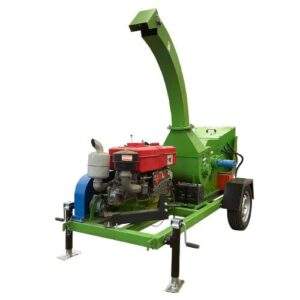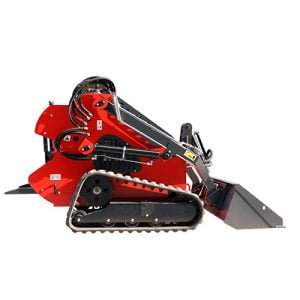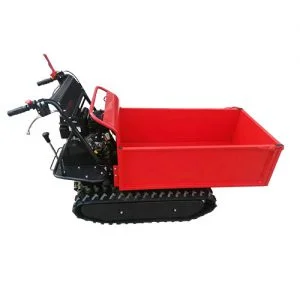The Benefits of Using an Orchard Tractor for Sustainable Farming
Introduction
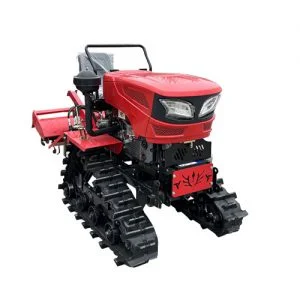
In sustainable farming, specialized equipment is essential for balancing productivity and environmental stewardship. Among these tools, the orchard tractor stands out as a vital asset designed for managing orchards and vineyards. This machinery not only enhances operational efficiency but also supports sustainable practices, making it a preferred choice for modern farmers. In this blog post, we will explore the numerous benefits of using an orchard tractor, focusing on its impact on soil health, efficiency, and the sustainability of farming operations.
Understanding Orchard Tractors
What is an Orchard Tractor?
An orchard tractor is a compact, specialized vehicle explicitly designed for use in orchards and vineyards. Unlike standard tractors, orchard tractors feature a design that prioritizes maneuverability in tight spaces and the ability to handle delicate crops without causing damage. Their construction often includes a shorter wheelbase and a smaller turning radius, allowing farmers to navigate narrow rows and avoid compacting the soil. This tailored design makes orchard tractors essential for effective orchard management.
Key Features
| Feature | Description |
|---|---|
| Compact Size | Enables access to narrow rows, reducing crop damage |
| Low Ground Pressure | Minimizes soil compaction, promoting healthy root systems |
| Specialized Attachments | Supports various tasks like mowing and spraying for increased versatility |
| High Maneuverability | Facilitates easy navigation in orchards, ensuring efficiency |
These key features make orchard tractors not only practical but also integral to implementing sustainable farming practices.
Environmental Benefits
Soil Health Improvement
One significant advantage of using an orchard tractor is its positive impact on soil health. Soil is the foundation of agricultural productivity, and maintaining its integrity is crucial. The low ground pressure design of tractors helps reduce compaction, which is essential for promoting aeration and water infiltration. This results in healthier root systems and enhanced microbial activity within the soil, both of which are critical for sustainable farming. Healthy soil leads to better crop yields and a reduced need for chemical fertilizers, ultimately fostering a more resilient agricultural system.
Reduced Carbon Footprint
As environmental concerns grow, the agricultural sector is increasingly focused on sustainability. Many modern orchard tractors are designed with eco-friendliness in mind, featuring advanced fuel-efficient engines and electric or hybrid options. This emphasis on reducing fuel consumption leads to lower greenhouse gas emissions, helping farmers decrease their carbon footprints. By adopting tractors, farmers can not only improve operational efficiency but also contribute positively to the fight against climate change.
Enhancing Farm Efficiency
Time and Labor Savings
Utilizing an orchard tractor can lead to considerable time and labor savings. With the ability to perform multiple tasks—such as tilling, spraying, and transporting—farmers can streamline their operations, reducing the time spent on manual labor and increasing productivity. This efficiency is particularly vital during peak seasons when timely interventions are necessary for crop health. By using an orchard tractor, farmers can focus their labor resources more strategically, allowing for more effective management of their orchards.
Versatility in Operations
Orchard tractors are designed to be highly versatile machines. They can be fitted with various attachments to perform a wide range of agricultural tasks, making them adaptable to the changing needs of a farm throughout the growing season. For example:
| Task | Attachment Type |
|---|---|
| Mowing | Flail Mower |
| Spraying | Boom Sprayer |
| Harvesting | Specialized Pickers |
| Tilling | Tiller |
This adaptability allows farmers to switch between tasks quickly and efficiently, maximizing productivity and reducing the need for multiple pieces of equipment.
Cost-Effectiveness
Initial Investment vs. Long-Term Savings
While the initial investment in an orchard tractor can be substantial, the long-term savings often outweigh this cost. Investing in quality machinery means farmers can perform various tasks without needing several different vehicles. This consolidation can lead to lower equipment costs over time and reduced operational complexities. Furthermore, enhanced efficiency often translates into increased crop yields, providing farmers with a better return on investment.
Maintenance Costs
Orchard tractors are typically engineered to withstand the rigors of agricultural work. As a result, they often incur lower maintenance costs compared to general-purpose tractors. Regular maintenance schedules, combined with the durability of these machines, can significantly extend their operational lifespan. By choosing an tractor, farmers can benefit from reduced downtime and enjoy the peace of mind that comes with reliable machinery.
Supporting Biodiversity
Habitat Preservation
Using orchard tractors promotes sustainable practices that can help preserve habitats for local wildlife. Heavy machinery often disrupts ecosystems, but the careful design and operation of orchard tractors minimize such disturbances. By allowing for a gentler approach to farming, these tractors contribute to maintaining biodiversity in and around agricultural lands. This commitment to preserving ecosystems not only benefits wildlife but also creates a more balanced agricultural environment.
Integrated Pest Management
Orchard tractors are essential tools for implementing Integrated Pest Management (IPM) strategies. IPM aims to manage pest populations with minimal environmental impact. By facilitating targeted applications of pesticides and fertilizers, tractors help reduce chemical use, thus promoting healthier orchards. This approach protects crops while safeguarding beneficial organisms that contribute to a thriving ecosystem.
Future Trends in Orchard Tractor Development
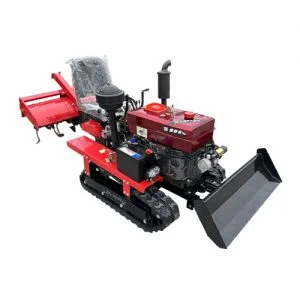
Technological Innovations
The future of orchard tractors is promising, with ongoing advancements in technology aimed at increasing efficiency and sustainability. Innovations such as precision agriculture allow for more accurate applications of inputs, reducing waste and improving crop health. GPS-guided systems enhance the precision of field operations, ensuring that every inch of land is managed effectively. These technological developments pave the way for a more efficient and sustainable approach to orchard management.
Electric and Autonomous Tractors
The rise of electric and autonomous orchard tractors represents a significant step towards sustainable farming. Electric models promise to drastically reduce fuel consumption and emissions, while autonomous systems can optimize field operations through advanced data analysis. By incorporating these technologies, farmers can enhance their efficiency and reduce their environmental impact, leading to a future where sustainable practices are the norm.
Conclusion
The benefits of using an orchard tractor for sustainable farming are clear and far-reaching. From improving soil health and reducing carbon footprints to enhancing farm efficiency and supporting biodiversity, these specialized machines are pivotal to modern agricultural practices. Investing in orchard tractors not only aligns with sustainable methodologies but also promotes long-term economic viability for farmers. By embracing this technology, farmers can cultivate healthier ecosystems while ensuring productive and profitable operations.
FAQ
What is the primary advantage of using an orchard tractor?
The primary advantage is their ability to operate in tight spaces with low ground pressure, promoting soil health and efficiency while minimizing crop damage.
Are orchard tractors environmentally friendly?
Yes, many modern models are designed to be fuel-efficient and produce lower emissions, contributing significantly to sustainable farming practices.
Can orchard tractors perform multiple tasks?
Absolutely! These specialized machines can be equipped with various attachments for tasks such as mowing, spraying, and tilling, making them versatile tools for farmers.
How do orchard tractors help with soil compaction?
With their low ground pressure design, orchard tractors reduce soil compaction, which is essential for maintaining healthy soil structure and promoting robust crop growth.
What future trends should we expect in orchard tractors?
Expect advancements in technology, such as electric models and autonomous systems, aimed at enhancing efficiency and sustainability in farming practices.

